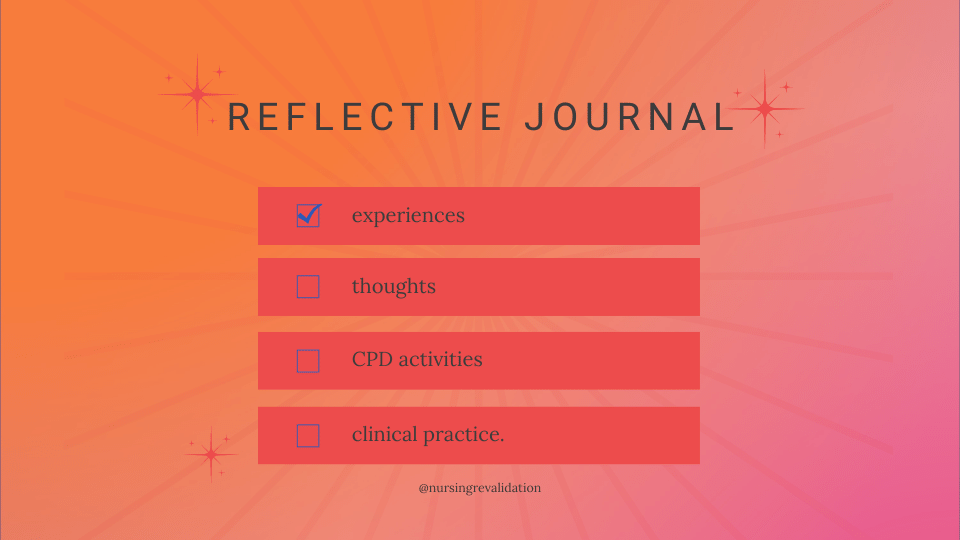Introduction:
The NMC in the UK introduced the concept of nursing revalidation in 2016, which aims to ensure that registered nurses and midwives continue to meet the profession’s standards throughout their careers. Revalidation involves collecting and documenting evidence that proves a nurse’s continued professional development and ongoing competency. One essential aspect of nursing revalidation is record-keeping. This blog post will explore the importance of record-keeping in nursing revalidation.
Why is Record-Keeping Important for Nursing Revalidation?

Record-keeping is a vital aspect of nursing practice, and it is even more critical when it comes to nursing revalidation. The NMC expects nurses and midwives to keep correct and up-to-date records of their ongoing professional development activitie. These records are necessary to prove that a nurse has met the requirements for revalidation, including the minimum number of hours (CPD) and reflective practice.
Tips for Keeping Accurate and Up-to-Date Records:
Plan:
Planning is critical when it comes to record-keeping for nursing revalidation. Nurses should find the types of evidence they need to collect, such as certificates of attendance for training courses, feedback from patients and colleagues, and evidence of reflective practice. They should also plan how to store this information, whether in a physical folder or electronically. By planning, nurses can ensure that they have all the necessary evidence and documentation to support their revalidation application.
Keep a Reflective Journal:

Reflection is a crucial aspect of nursing practice and revalidation. Nurses should keep a reflective journal, where they can document their experiences, thoughts, and feelings about their professional development activities and clinical practice. Reflective journals can help nurses to find areas where they need to improve and develop, which can inform their ongoing CPD. They can also supply evidence of reflective practice, which is a requirement for nursing revalidation.
Document Feedback:
Feedback from patients, colleagues, and service users is an essential aspect of nursing practice and revalidation. Nurses should document all feedback they receive, including positive and negative comments. This feedback can help nurses to show their strengths and weaknesses, which can inform their ongoing professional development. It can also provide evidence that they are engaging with patients and colleagues and taking steps to improve their practice.
Keep a CPD Log:
Nurses should keep a log of their CPD activities, including the dates, type of activity, and number of hours completed. The NMC requires nurses to complete at least 35 hours of CPD every three years, so it is essential to keep track of the hours completed. The CPD log can also help nurses to find any gaps in their knowledge or skills, which can inform their ongoing development.
Conclusion:
In conclusion, record-keeping is an essential aspect of nursing revalidation. It is crucial to keep correct and up-to-date records of professional development activities. By planning, keeping a reflective journal, documenting feedback, and keeping a CPD log, nurses can ensure that they have all the necessary evidence to support their revalidation application. Effective record-keeping can help nurses to find areas for development, prove their ongoing competency, and supply safe and effective care to patients.
FAQ’S
What types of evidence do I need to collect for nursing revalidation record-keeping?
Nurses and midwives should collect evidence that proves their ongoing professional development, clinical practice, and feedback from patients and colleagues. This can include certificates of attendance for training courses, reflective journals, feedback forms, and records of CPD activities.
Can I keep my revalidation records electronically?
Yes, nurses and midwives can keep their revalidation records electronically if secure and accessible. Electronic records can be stored on a computer, cloud-based storage, or mobile devices.
How often should I update my revalidation records?
Nurses and midwives should update their revalidation records regularly to ensure that they are correct and up to date. It is recommended to update records at least every six months, or whenever new evidence is collected.
What should I do if I cannot find evidence of my earlier professional development activities?
If you cannot find evidence of earlier professional development activities, you should try to obtain them by contacting the relevant organizations or individuals. If this is not possible, you should document your efforts to obtain the evidence in your revalidation records.
What happens if I do not meet the requirements for nursing revalidation?
If a nurse or midwife does not meet the requirements for revalidation, they cannot renew their registration with the NMC, and their ability to practice as a registered nurse or midwife in the UK will be affected. Therefore, it is essential to keep correct and up-to-date records and ensure that you meet the requirements for revalidation.

